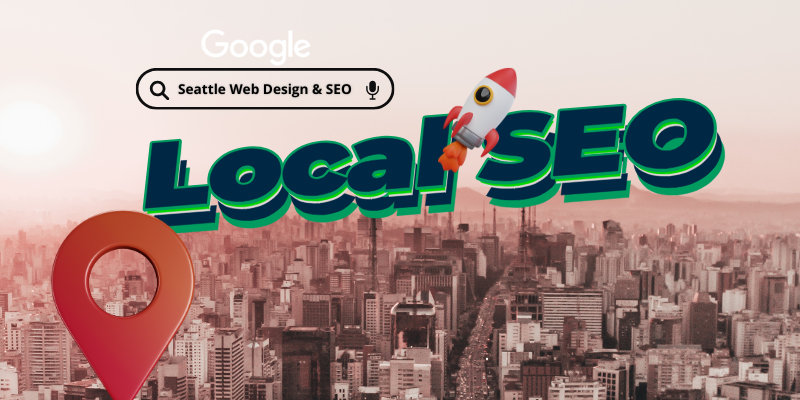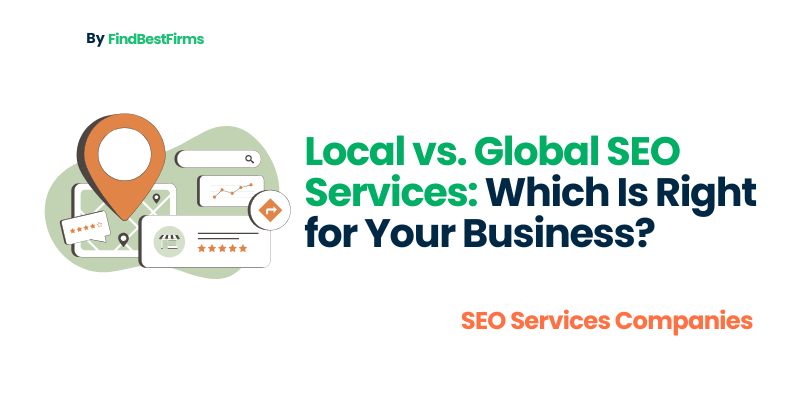As digital marketing changes quickly, business visibility and growth still depend greatly on SEO. Still, a key issue for businesses of all kinds is deciding whether to target SEO locally or around the world.
There isn’t always a straightforward solution. Your business goals, who your target audience is, how large your operation is and your marketing plan will determine the answer. We’ll discuss both kinds of SEO in this blog post, explaining what they have in common and the moments when you should apply them..png)
What Is Local SEO?

Local SEO is the process of optimizing your online presence to attract more business from relevant local searches on Google and other search engines. These searches often include specific geographic locations such as cities, towns, or neighborhoods.
Key Elements of Local SEO:
Google Business Profile (formerly Google My Business)
NAP (Name, Address, Phone Number) consistency
Local reviews and ratings
Location-specific keywords
Citations and listings on local directories
Who Should Use Local SEO?
Small businesses with a physical storefront (e.g., cafés, salons, dental clinics)
Service-based businesses operating in a specific region (e.g., HVAC services, plumbers)
Multi-location brands targeting different local markets
According to Google, 76% of people who search for something nearby on their smartphones visit a business within a day, and 28% of those searches result in a purchase. These stats highlight the importance of local SEO for capturing in-the-moment customer intent.
What Is Global SEO?
Global SEO focuses on optimizing your website for an international audience. It’s about expanding your online reach beyond regional boundaries and making your content accessible, relevant, and competitive across multiple countries and languages.
Key Elements of Global SEO:
Multilingual and multiregional targeting
Hreflang tags for language targeting
International keyword research
Cultural adaptation of content (localization)
Geotargeting in Google Search Console
Who Should Use Global SEO
E-commerce businesses shipping internationally
SaaS companies with a worldwide user base
Educational platforms and online courses targeting global learners
Enterprises with overseas branches or expansion goals
A report by Shopify shows that 57% of online shoppers have made a purchase from an overseas retailer. If your offerings aren’t restricted by location, global SEO could open doors to new markets and revenue streams.
Key Differences: Local SEO vs. Global SEO
| Aspect | Local SEO | Global SEO |
| Target Audience | Customers in a specific geographic location | Customers across multiple countries/regions |
| Keyword Focus | Location-specific keywords | Language- and region-appropriate global keywords |
| Optimization Tools | Google Business Profile, local directories | Hreflang, multilingual content, international keyword tools |
| Content Strategy | Community-focused content, events, local news | Globally-relevant content adapted for different cultures |
| Website Structure | Simple site with a localized approach | Complex site architecture for multilingual/multiregional targeting |
Pros and Cons of Local SEO
✅ Pros:
Cost-effective for small businesses
Quick ROI in specific locations
Drives foot traffic to stores or offices
Easier to rank in location-based search results
❌ Cons:
Limited reach outside your targeted area
May not scale well with international expansion
Heavily reliant on local reviews and reputation
Pros and Cons of Global SEO
✅ Pros:
Expands brand visibility across borders
Opens up new revenue opportunities
Long-term growth potential
Supports multi-market strategies
❌ Cons:
Requires more technical expertise
Higher investment in content localization and translation
Competition is often fiercer
How to Decide: Local or Global?
Here are a few questions to ask yourself when deciding between local and global SEO:
1. Where Is Your Audience?
If your clients or customers are within a specific geographic area, local SEO is the clear winner. If your product or service caters to a wider demographic, consider global SEO.
2. What Are Your Business Goals?
Are you looking to drive more in-store visits or increase local leads? Go local. Trying to expand brand awareness or enter international markets? Go global.
3. Do You Have the Resources?
Global SEO typically requires more time, budget, and multilingual capabilities. If you’re a lean team, local SEO might deliver better short-term returns.
4. Are You Selling Products or Services?
Product-based eCommerce stores can benefit more from global strategies, especially with cross-border shipping options. Service-based providers often do better with hyper-local targeting.
Combining Local and Global SEO: A Hybrid Approach
Many growing businesses eventually combine both strategies. For instance, a national retailer with multiple store locations might use local SEO for each store, while also using global SEO to build brand authority internationally.
Case in Point:
Imagine you’re a skincare brand based in California with physical outlets in 10 U.S. cities. You’d use local SEO to target customers in each city—while also deploying global SEO tactics to promote your online shop in Europe or Asia.
This hybrid model ensures that you don’t miss opportunities on either front.
Real-World Stats That Matter
According to BrightLocal, 87% of consumers read online reviews for local businesses in 2023.
Google reports that “near me” mobile searches have grown over 500% in recent years.
HubSpot states that 61% of marketers say improving SEO and growing their organic presence is a top inbound marketing priority.
Data from Statista shows that the number of digital buyers worldwide is expected to surpass 2.7 billion by 2025, indicating massive potential for global online sales.
Top SEO Companies help brands raise their visibility on the web by following proven and technical methods. Among the things these agencies focus on are comprehensive keyword research, technical checks, optimizing the website, acquiring quality links, making effective content and studying performance data.
Leading firms such as Exaalgia, WebFX, and Ignite Visibility are recognized for deploying data-driven SEO strategies aligned with the latest search engine algorithm updates. By leveraging tools like Google Search Console, SEMrush, and Ahrefs, these agencies provide actionable insights and measurable outcomes.
By linking their SEO work to what the business wants to accomplish, they assist companies in getting organic attention, attracting valuable visitors and boosting how many conversions they make. A partnership with a leading SEO agency makes your company stronger and supports continuous success in the online world. If you want to see better outcomes and higher return on investment, working with experienced SEO experts is important.
Final Words
Local or global SEO should be chosen depending on how your business operates, which markets you serve and your long-term goals.
If your goal is to increase customers in a specific region, local SEO works best and is more affordable. If you want to grow across different nations, gain trust around the world and increase your sales globally, global SEO is the solution.
Whether you take one route or another, SEO is a necessity. It is a key part of being successful online. The right strategy, no matter if it’s for a local or worldwide campaign, helps bring in meaningful visits, connect with your target clients and boost your business with confidence.

